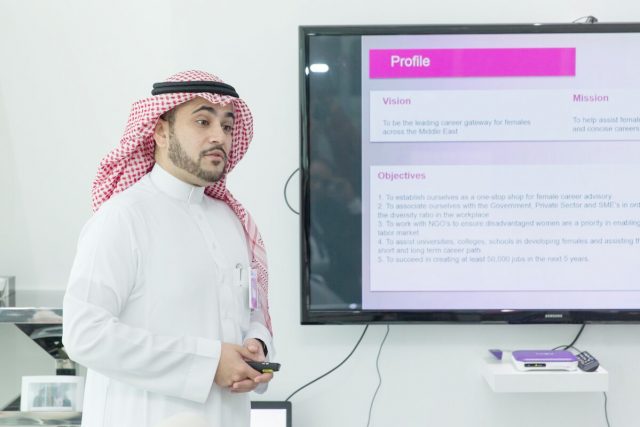
Glowork Saudi project named among 15 WISE Awards finalists
The Saudi project Glowork, has been named amongst the 15 finalists selected for the 2016 WISE Awards organized by the World Innovation Summit for Education.
Glowork is a Saudi social enterprise that was founded in 2011 in Saudi Arabia. The project is the first women’s employment organization in the Middle East aiming to linking female jobseekers with employers.
With female Saudi unemployment representing almost 34 percent, Glowork provides an online job portal exclusively for female jobseekers, listing thousands of job opportunities for women in different fields and matching skilled women with opportunities.
Glowork has also established relationships with Saudi Arabia’s Ministry of Labor and the Human Resource Development Fund as well as universities and colleges that educate women to facilitate job matchmaking.
While devising culturally sensitive technology, Glowork allows women to work virtually from home in rural areas and has managed to place over 30,000 women throughout the Saudi labor force in the last four years.
Commenting on the nomination, the Founder of Glowork, Khalid Al Khudair, said, “I am honored to be chosen as one of the 15 finalists of 2016 WISE Awards. This nomination is of great importance to us and will have a positive impact on Glowork. It will support us in raising awareness of the role women play and the importance of empowering them.”
Inaugurated by Qatar Foundation in 2009, under the leadership of its Chairperson Sheikha Moza Bint Nasser, the WISE Awards identify and promote the most innovative and effective approaches to key global education challenges, and build a network of change-makers to inspire others around the world.
Selected by a pre-Jury of international education experts, the 2016 WISE Awards Finalists offer creative solutions in access, quality education, the teaching of STEM and entrepreneurial skills. Together they address a wide range of issues that represent common global challenges.
The members of pre-Jury are Kamel Braham, program leader at the World Bank Human Development Program for the Maghreb; Dr. Rajika Bhandari, director at the IIE Center for Academic Mobility Research, Adel Boseli, head of incubation department, Qatar Business Incubation Center; Ms. Anna Penido, director, Inspirare Institute, Brazil and Dr. Florence Tobo Lobé, founder and president of the Rubisadt Foundation in Cameroon
Dr. Tobo Lobé commented on her experience of being part of the pre-Jury: “I feel honored and proud to have had the opportunity to assess enriching projects fostering peace, well-being and growth in communities worldwide. The WISE Awards are an excellent way to scale and update strategies for more beneficiaries and for better lives worldwide.”
The WISE Awards Finalist projects were selected according to strict criteria requiring them to demonstrate innovative thinking and a concrete, positive impact on their communities, as well as the potential to be replicated in other contexts and regions.
The WISE Awards Jury will determine the six winners in September 2016. In addition to publicity and networking opportunities, each winning project will receive $20,000.
Each year the WISE Awards recognize and promote six successful innovative projects that are addressing global education challenges. Since 2009, WISE has received more than 2,800 applications from over 151 countries. Forty-two projects have been recognized around the world from a variety of sectors for their innovative character, their positive contribution and for scalability and adaptability.
The 2016 WISE Awards Finalists: Geekie, Brazil; Ideas Box, France; Sports for Sharing, Mexico; Smart Robot Coding School, South Korea; Glowork, Saudi Arabia; Tara Akshar Literacy Program, India; Lights for Learning, Spain/Latin America; Partners for Possibility, South Africa; Little Ripples, USA/Chad; Jump Math, Canada; Youth for Technology Academy, USA/Nigeria; Sonidos de la Tierra, Paraguay; 1Kgbox, China; Education for growth and value creation in Lebanon, Lebanon; From puppets to empowerment, Bosnia and Herzegovina.



























